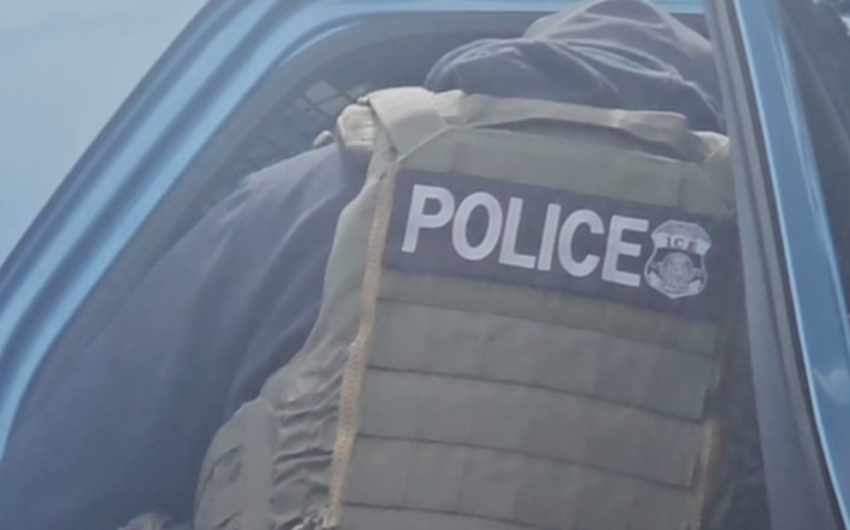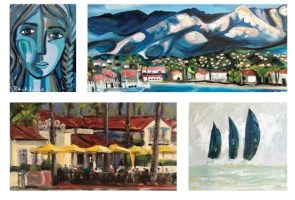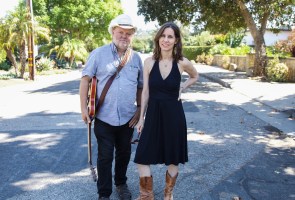UC President’s Ban on Encampments, Face Masks That ‘Conceal Identity’ Set to Go into Effect at UC Santa Barbara
Some Students and Student Leaders Express Unease over UC’s New Protest-Related Policies

This past spring, waves of demonstrations surged across UC campuses. Thousands of students and academic workers protested the escalating violence in Gaza and the UC’s investment in weapons manufacturing companies.
At UC Santa Barbara, an autonomous collective of students, faculty, and community members established a pro-Palestinian encampment dubbed the UCSB Liberated Zone. The encampment was set up early in the morning on May 1 and occupied the space between Davidson Library and North Hall until June 24, when it was swept by dozens of militarized police officers, who arrested five individuals. Another autonomous group, referred to as Say Genocide, took over UCSB’s Girvetz Hall for more than a day until UCSB administration deployed police to remove the masked occupants, who had already exited the building by the time authorities arrived. No arrests were made in that case.
In response to the upheaval that marked spring quarter, and with the school year rapidly approaching, UC President Michael Drake issued a directive that bans encampments and face masks to “conceal identity.” Reactions across the UC community have been polarizing.
The statement from Drake was released on Monday, August 19, only days after a similar message had been sent out by leadership at California State University. Drake’s email clarified preexisting university rules in an effort to “ensure a safe, inclusive campus climate.” He went on to explain that certain “expressive activities” will be prohibited moving forward, specifically “camping or encampments, unauthorized structures, restrictions on free movement, masking to conceal identity, and refusing to reveal one’s identity when asked to do so by University personnel.”
Academic Workers’ Union Demands to Bargain
Drake’s directive has received widespread backlash, perhaps most publicly from UAW 4811, the union that represents more than 48,000 academic workers at the UC. UAW 4811 has since put out a Demand to Bargain, claiming that this unilateral application of UC policy curtails academic freedom.
“The law is clear — UC cannot unilaterally change the terms of our employment,” said Max Green, graduate student researcher at UC Berkeley. “We are demanding that UC come to the bargaining table to negotiate this profound new limit on our ability to exercise our free speech rights within our workplace.”
In a statement to UC administrators, Rafael Jaime, president of UAW 4811, wrote, “[T]he University has proposed a new policy(s) that has a significant and consequential impact on the terms and conditions of employment for members of UAW bargaining units. As a result, the UAW is requesting to meet and confer over this policy(s).”
This Demand to Bargain addresses grievances that have been previously voiced by UAW 4811. In May, UAW 4811 voted to authorize a strike following the mass arrests and forcible removal of peaceful protesters — including UAW 4811 members— across UC campuses. Contending that this crackdown violated free speech rights and academic freedom, UAW 4811 filed unfair labor practices against the UC and organized UC-wide walkouts. The strike was ultimately put on hold when UC sued the union, labeling the strike illegal.

Growing Unease at UCSB
With fall quarter set to begin in less than two weeks, there is growing unease among UCSB students and student leaders, as well. UCSB Associated Students Senator Dan Siddiqui shared his concerns that this directive has the potential to trigger harsh discriminatory practices, especially against Muslim students on campus.
“There are no explicitly stated religious or medical exemptions when talking about wearing masks to conceal identity,” Siddiqui noted. “It’s so ambiguous and very vague. [In my conversation with administration], they said that the parameters for deciding would be that they have to see half of someone’s face. But what if there is a Muslim student wearing a hijab and [also] a mask? I think that it can very, very easily lead to discrimination.”
UCSB AS Senator Dominic Wang similarly expressed fear that this new masking protocol will aggravate the current surge in COVID cases, disproportionately affecting disabled and immunocompromised students and staff.
“As someone who has had a COVID infection and who experienced some pretty bad side effects, it’s been very frustrating to see that people aren’t taking masking seriously,” said Wang. “I feel like it’s going to be a disaster in terms of disability rights. People don’t really think about immunocompromised individuals. This will definitely impact their ability to go out into the world.”
‘UC Campuses Support and Protect Free Speech’
The Office of Public Affairs & Communications at UCSB declined to provide input about how the directive will be implemented at UCSB in particular, instead pointing to the University of California Office of the President (UCOP) for any inquiries.
Stett Holbrook from UCOP attempted to clear up apprehensions about how the masking guidelines will be enforced. He commented, “Wearing masks or face coverings is permissible for all persons who are complying with University policies and applicable laws.”
Holbrook also responded to complaints that these bans will challenge free speech. Echoing sentiments from Drake’s email, Holbrook said, “UC campuses support and protect free speech, including nonviolent and lawful protests. This is a fundamental UC value. At the same time, all members of the UC community remain subject to all applicable laws, policies, and relevant codes of conduct, even while engaging in protest activities.”
He explained that the University will use a “tiered response approach” when confronting unlawful behavior.
“Individuals will first be informed of the violation(s), asked to [stop], and then directed to take corrective actions and modify their behavior. Higher severity violations may warrant further action and accountability review,” Holbrook outlined. “Any member of the University community who is arrested for unlawful behavior or cited for a violation of University policy must go through the applicable campus review process, such as the student code of conduct or employee disciplinary process.”

‘Attempts to Intimidate’
Josh Levine, executive director at the Jewish student life organization Santa Barbara Hillel in Isla Vista, shared a similar sentiment. He recognized the importance of free speech on college campuses but said that certain actions last year went too far.
“There needs to be ample room on college campuses for peaceful protests, from a variety of perspectives, expressing a variety of viewpoints,” Levine said. “Where it crossed the line last year is that there were attempts to intimidate students, faculty, and staff, and attempts to prevent the free flow of students, faculty, and staff in public places. Those were two of the main issues that Jewish students and non-Jewish students had with the encampment that cropped up on the UCSB campus.”
He projected optimism that the UC’s policy will, hopefully, ensure that “students and community members are able to participate fully and equally in university life.”
“All students should be able to attend university free of harassment and discrimination,” he emphasized. “This should be a place of open dialogue, of true learning for everybody regardless of what their background is, regardless of what their perspective is on what’s happening in the Middle East.”
Censoring Students?
Siddiqui offered an alternative perspective, suggesting that Drake’s directive is indicative of a broader phenomenon, asserting, “This is the direction that the University of California is heading in. Look at the Regents passing [Item J2], censoring faculty. Now they’re trying to censor students.”
Item J2, initially proposed by the UC Regents in January as Item J1, prohibits university departments from making political statements on their website homepages.
Both Siddiqui and Wang argued that this email plays into a one-sided narrative that has enabled aggression against marginalized students for years. Siddiqui mentioned that, since assuming his position as AS senator in May, he has been doxxed and harassed by students who disagree with his pro-Palestine politics. Wang has likewise faced threats. Siddiqui implied that these experiences are not isolated incidents but, rather, outcroppings of a systemic bias that favors and protects certain students over others.
When describing his initial reaction to Drake’s email, Siddiqui said, “I started to think back to some of the micro-level incidents that I’ve seen this past year. There was a prior elected official who went to a student on campus and accused them of supporting Hamas, when they weren’t, and told them ‘You deserve to be raped and killed.’ That case went through four different university offices and nothing happened.”
This incident was covered in April by the Daily Nexus, UCSB’s student-run newspaper.
He continued, “This is how UCSB handles cases of Islamophobia. This is how they handle discrimination against Muslim and Arab students. They always only address one side of the issue. I have never felt safe on campus as a result of my participation in campus life, and these new policies imposed by UCOP and the CA State Legislature make me feel even less safe.”
Premier Events
Wed, Jan 29
9:00 PM
Santa Barbara
Nicole Sophia Band at Sandbar
Fri, Jan 31
5:00 PM
Santa Barbara
Artist Talk at Art & Soul on State Street
Sat, Feb 08
10:00 AM
Santa Barbara
Annual SB Botanic Garden Conservation Symposium
Tue, Jan 28
5:00 PM
Zoom
Fire Safety Community Zoom Meeting
Thu, Jan 30
7:00 PM
Solvang
Lucinda Lane Album-Release Show, at Lost Chord Guitars
Fri, Jan 31
9:00 AM
Goleta
AARP FREE TAX PREPARATION
Fri, Jan 31
5:00 PM
Santa Barbara
Artist Talk at Art & Soul on State Street
Sun, Feb 02
1:00 PM
Santa Barbara
2025 Lunar New Year Family Festival
Sun, Feb 02
6:00 PM
Santa Barbara
Contra Dance with Live Band 💃
Sat, Feb 08
10:00 AM
Santa Barbara
Paseo Nuevo Kids Club
Sat, Feb 08
12:30 PM
Solvang
Garagiste Wine Festival
Tue, Feb 11
10:30 AM
Santa Barbara
The Golden Road: Strategies for Staying Behind the Wheel as You Age
Tue, Feb 11
8:00 PM
Santa Barbara
SBIFF – Tribute to Timothée Chalamet
Wed, Jan 29 9:00 PM
Santa Barbara
Nicole Sophia Band at Sandbar
Fri, Jan 31 5:00 PM
Santa Barbara
Artist Talk at Art & Soul on State Street
Sat, Feb 08 10:00 AM
Santa Barbara
Annual SB Botanic Garden Conservation Symposium
Tue, Jan 28 5:00 PM
Zoom
Fire Safety Community Zoom Meeting
Thu, Jan 30 7:00 PM
Solvang
Lucinda Lane Album-Release Show, at Lost Chord Guitars
Fri, Jan 31 9:00 AM
Goleta
AARP FREE TAX PREPARATION
Fri, Jan 31 5:00 PM
Santa Barbara
Artist Talk at Art & Soul on State Street
Sun, Feb 02 1:00 PM
Santa Barbara
2025 Lunar New Year Family Festival
Sun, Feb 02 6:00 PM
Santa Barbara
Contra Dance with Live Band 💃
Sat, Feb 08 10:00 AM
Santa Barbara
Paseo Nuevo Kids Club
Sat, Feb 08 12:30 PM
Solvang
Garagiste Wine Festival
Tue, Feb 11 10:30 AM
Santa Barbara
The Golden Road: Strategies for Staying Behind the Wheel as You Age
Tue, Feb 11 8:00 PM
Santa Barbara







![Lompoc Opts Out of Wine Country [Corrected]](https://www.independent.com/wp-content/uploads/2025/01/Lompoc_Scenic_Hills_Vineyards_JeremyBall.jpg?resize=850%2C530)

















You must be logged in to post a comment.